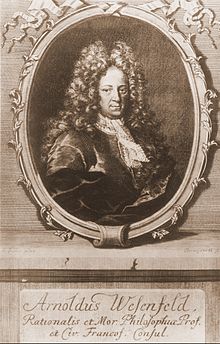Arnold Wesenfeld
Arnold Wesenfeld also: Arnoldus, also: Vesenfeld (* July 10, 1664 in Bremen ; † October 8, 1727 or October 12, 1727 in Frankfurt (Oder) ) was a German university professor and rector of the Brandenburg University of Frankfurt and mayor of the city of Frankfurt a. O.
Life
Arnold Wesenfeld was born in 1664 as the son of the Bremen merchant Arnold III. (Arend) Vesenfeld and his wife Anna, b. Wessels, born in Bremen. There he first went to Latin school and three years after the death of his father in 1681 he entered the Bremen grammar school , where he spent several years. Under the care of his uncle, Prof. theol. et phil. Johann Riesselmann , who held the father's position, studied theology , philosophy and fine sciences at the University of Frankfurt (Oder) . Later he got to know the author of numerous writings, the Danzig theologian Stephanus Wolters, with whose daughter Cornelia he married on October 20, 1699 in Danzig. This marriage gave birth to nine children, four of whom died in childhood. His descendants include the factory owners Carl Ludwig Wesenfeld and Paul Wesenfeld and the children of the Barmer factory owner Julius Erbslöh .
Act
On April 17, 1691, Wesenfeld received his doctorate in philosophy and gave lectures at Frankfurt University. On February 1st of the following year he was accepted into the professorial office of the university as professor of logic , ethics and metaphysics or of rational and ethical philosophy . In 1698 and 1703 Arnold Wesenfeld was the rector's office. He enjoyed general trust in urban circles too. The citizens elected him as consul in the Senate and for many years he held the office of second mayor of the city on a part-time basis. In addition to this varied official activity, Arnold was also active as a writer and published a number of writings and speeches. While his treatise To the Gentiles, who were searching in the midst of Christians but who found in vain, described the real conditions of Christianity at that time , written in German in 1718 , the attempt to improve morality among Christians, published in 1721, shows a deep penetration into the philosophical problems of the time. Philipp Jacob Spener had caused a sensation in 1675 with his Pia desideria and worked towards an improvement in ecclesiastical Christianity, which had been flattened into rigid orthodoxy. The pietism that developed from this originated with Spener from the Lutheran side, but was also echoed in Reformed circles. With his writings, Wesenfeld intervened in these currents, in which he too advocated an improvement in life and change.
Fonts (selection)
- De iniuria hominis in se quoad animam et dignitatem hominis. Dissertation, Frankfurt / O. 1691.
- Dissertatio de natura definitionis. Frankfurt / O. 1692.
- Dissertationes IV de philosophia sectaria et electica. Frankfurt / O. 1694.
- Georgica animae et vitae. A theoretical and practical treatise on the states of mind and passions. Frankfurt / O. 1696.
- Passiones animi. Frankfurt / O. 1713.
- To the heathen searching in the midst of Christians but finding in vain. Frankfurt / O. 1718.
- Theosophia theoretico-practica. Frankfurt / O. 1721.
- Attempt to improve morality among Christians. Frankfurt / O. 1721.
- Methodus disserendi et conferendi, he ratio et via recte disserendi. Frankfurt / O. 1729.
literature
- –I–: Wesenfeld, Arnold . In: Allgemeine Deutsche Biographie (ADB). Volume 42, Duncker & Humblot, Leipzig 1897, p. 138 f.
- Bremen State Archives: Arnold Vesenfeld (1622–1678). In: Wahrtum Akten (Q 6 B VIII 1 (a-) 1 and Q 6 B VIII 5) Wittheit protocols (council protocol) from July 7th, 1678, p. 36, as well as citizens' book , note on December 20th, 1670.
- Wesenfeld, Arnold. In: Johann Heinrich Zedler : Large complete universal lexicon of all sciences and arts . Volume 55, Leipzig 1748, column 781 f.
- Christian Gottlieb Jöcher: General scholarly lexicon. Johann Friedrich Gleditschen's bookstore, Leipzig 1750/51.
- Johann Diedrich vd stones: Westphalian history. Th. IV., Lemgo 1760, p. 623.
- Friedrich August Carus: Nachged Werke, Part III, History of Psychology. Barth-Kummer, Leipzig 1808.
- Ernst Walter Röhrig: On the history of the Wesenfeld family. Barmen 1929.
- Erbslöh archive. Family association Julius Erbslöh, Wuppertal / Springe 2010.
Web links
- Pedigree of Arnold Wesenfeld
- Arnold Wesenfeld in the family history of Erbslöh
- Arnold Wesenfeld in the portrait collection of the University of Amsterdam
Individual evidence
- ↑ Baptismal register of the Ev. St. Ansgari parish Bremen
- ↑ Carl Joseph Bouginé: Handbook of the general Litterar history after Heumann's plan. Volume 5, Zurich 1792, p. 66 f. ( Google Books )
- ↑ Ernst Walter Röhrig: On the history of the Wesenfeld family. Barmen 1929, p. 39 (this information is probably the date of the entry in the death register = burial).
| personal data | |
|---|---|
| SURNAME | Wesenfeld, Arnold |
| ALTERNATIVE NAMES | Wesenfeld, Arnoldus; Vesenfeld, Arnold |
| BRIEF DESCRIPTION | German university professor, rector and mayor |
| DATE OF BIRTH | July 10, 1664 |
| PLACE OF BIRTH | Bremen |
| DATE OF DEATH | October 8, 1727 or October 12, 1727 |
| Place of death | Frankfurt (Oder) |
